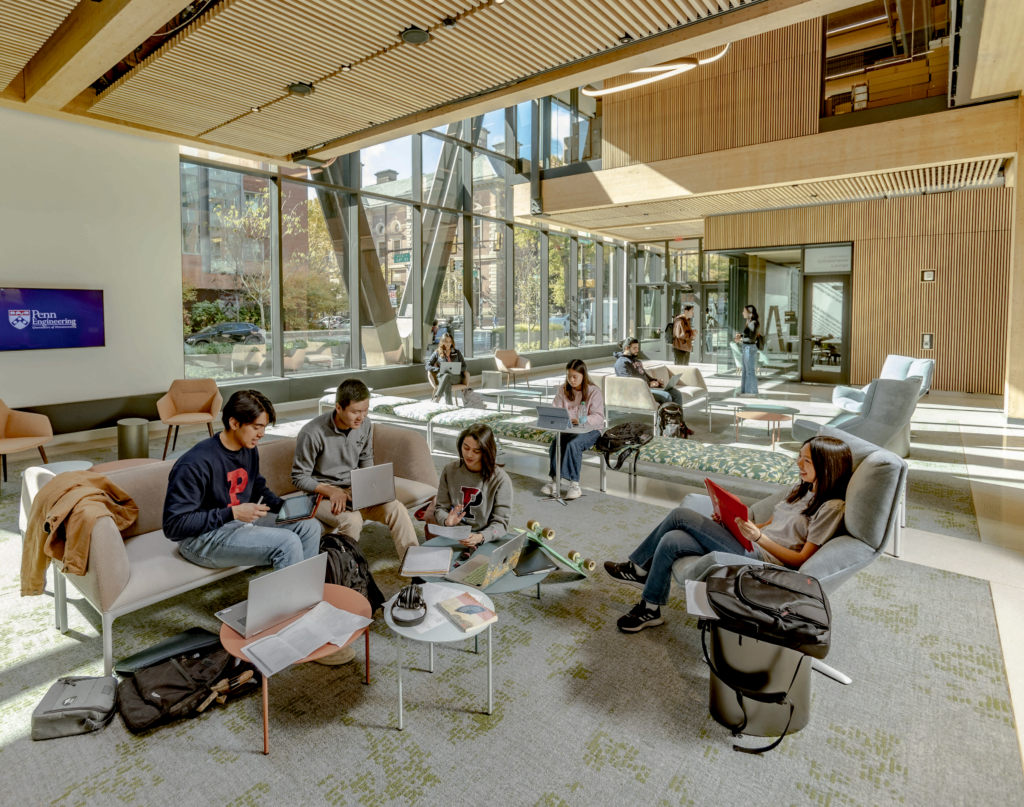
On September 27 , more than 200 members of the Penn community and honored guests gathered in the Stavis Family Auditorium in Amy Gutmann Hall to formally dedicate and open the University’s new home for innovation in data science and AI.
“This is a day for celebration,” said Vijay Kumar, Nemirovsky Family Dean of Penn Engineering, while welcoming the group. “I am proud to say that Penn has been at the forefront of the data science and AI revolution, and with this new building, the sky is the limit.”
Held nearly three years to the date of the building’s early October 2021 groundbreaking, the ceremony welcomed attendees inside the building for the first time, where they could experience the soaring six-floor, 116,000-square-foot facility that will produce the engineers and the technologies that will bring us the future of collaborative AI and data-driven solutions.
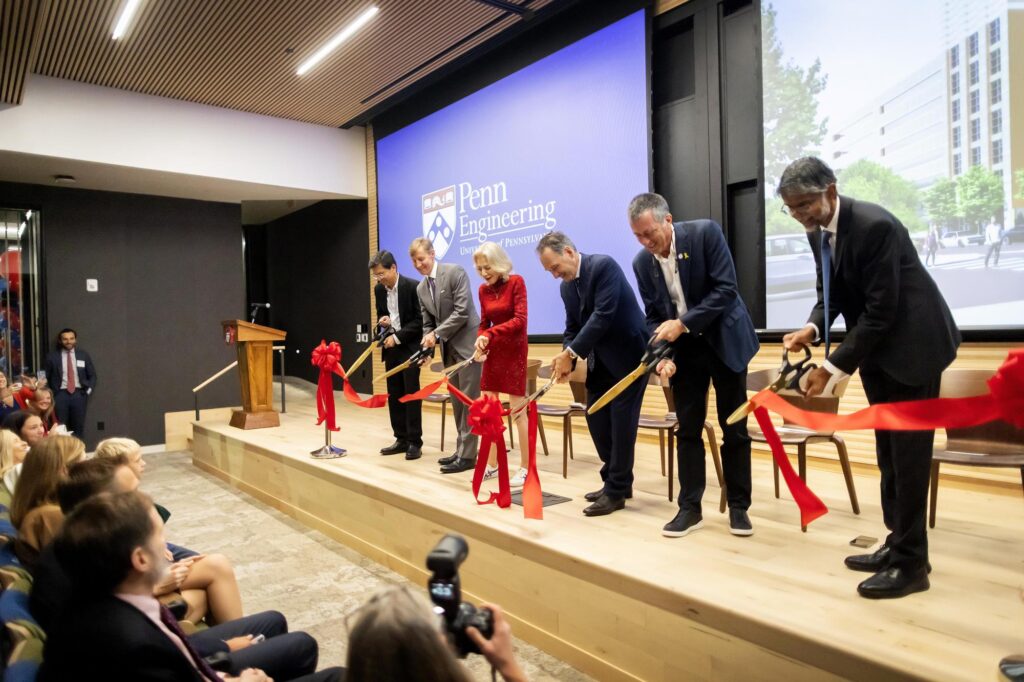
The formal dedication of Amy Gutmann Hall occurred in September at a University-wide
event that included celebratory remarks and a ribbon-cutting ceremony.
“Amy Gutmann Hall will be a place for discovery and breakthroughs, and there are already so many of these happening at Penn,” said J. Larry Jameson, Interim President. “From physics to political science, from art to archeology, these are going to be represented here.”
With the addition of this new facility, Penn is poised to continue its trajectory of leadership in addressing grand challenges. “Things we only thought of as science fiction are now becoming realities. And some of those realities will emerge in Amy Gutmann Hall,” said Ramanan Raghavendran (ENG’89, W’89, LPS’15), Chair, Board of Trustees. “Our world faces many great challenges — in health care, in education, in public policy, in climate and sustainability. At Penn, we take on these challenges. We find solutions.”
“It wasn’t that long ago that Amy Gutmann Hall was just an inspired idea,” said Rob Stavis (EAS’84, W’84), University Trustee and Chair of Penn Engineering’s Board of Advisors, as he led the group in a toast marking the occasion. “Thanks to the effort and commitment of so many in this room, this bold plan was transformed into a spectacular reality.”
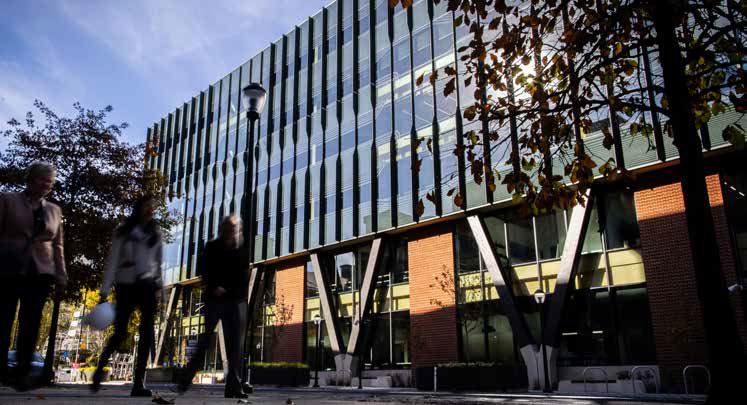
The Future of Data Science and AI
Located at 34th and Chestnut Streets, Amy Gutmann Hall expands the School’s existing footprint by about 20% and boasts an impressive array of spaces for research, teaching and student collaboration, centralizing resources and tools for scholars from across Penn and beyond. Highlights include dedicated cross-disciplinary research spaces, leading-edge teaching labs, a Data Science Hub and flexible, multi-use learning spaces that enhance community building.
“Amy Gutmann Hall is designed to welcome you in with open, warm spaces. As you move up through the building, you start to transition from spaces for the whole community to specialized spaces for research and collaboration,” says Zachary Ives, Adani President’s Distinguished Professor and Chair of Computer and Information Science (CIS). “From the outside, you can see into the labs and classrooms, and we can showcase Penn Engineering in a way we haven’t before.”
The building will empower Penn Engineers and their collaborators to conduct interdisciplinary research in a field that has transformed scientific discovery, is rapidly advancing and is making its impact felt in disciplines as diverse as public policy, medicine, meteorology and law.
“I see the future as being the integration of data-driven approaches — AI together with machine learning — and data science approaches, which are model-based approaches,” says René Vidal, Penn Integrates Knowledge and Rachleff University Professor in Electrical and Systems Engineering (ESE) and in Radiology and Director of the Innovation in Data Engineering and Science (IDEAS) initiative at Penn. “Looking at the field even just 10 years ago, the progress is staggering. Amy Gutmann Hall will bring us to the next level of addressing this integration and translating advancements in AI to many applications. It’s truly exciting.”
Transformational Support
HARLAN M. STONE (C’80)
Amy Gutmann Hall was made possible by a transformative, $25 million commitment — the largest in Penn Engineering’s history — from Harlan M. Stone (C’80) in 2019. A University Trustee, member of Penn Engineering’s Board of Advisors and Chair of the School’s Technical Advisory Board, Stone has been a lifelong advocate of integrating engineering with the arts and humanities. An alumnus of Penn Arts & Sciences and a Penn Engineering parent, Stone, in consultation with the University, chose to name the building in honor of Amy Gutmann for her extraordinary vision and leadership.
“We all know that Amy has been and remains very important to the mission and the values of the University of Pennsylvania,” said Stone during his September 27 dedication remarks. “Amy Gutmann has been much more than the longest-serving President in our University’s history; she is also an eminent educator and an incredible voice — loud and clear — for the accessibility of education in our nation, a fundamental part of our democracy.”
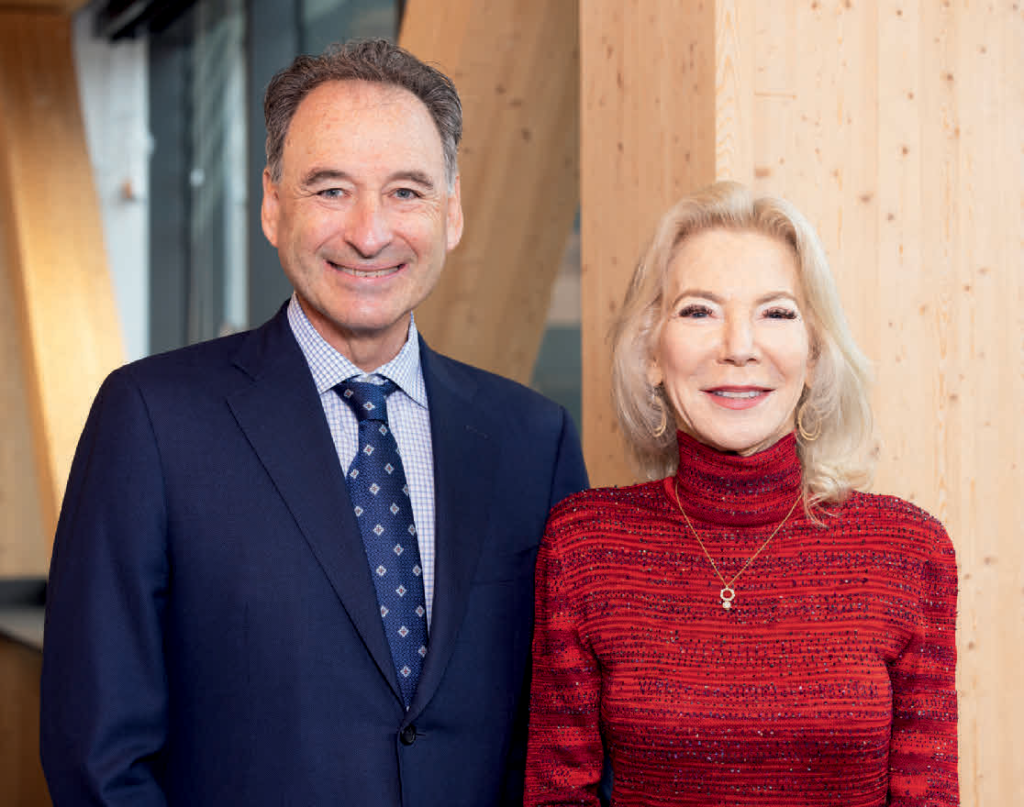
AMY GUTMANN
The Honorable Amy Gutmann (HON’22), who served as U.S. Ambassador to Germany from 2022–2024, is President Emerita of Penn, the Christopher H. Browne Distinguished Professor of Political Science in Penn Arts & Sciences and a Professor of Communication in the Annenberg School for Communication. As Penn’s eighth and longest-serving President, Gutmann left an indelible mark on the University, shaping its future and elevating it to new heights of academic excellence, innovation and global influence.
“‘Find a path forward or make it,’” said Gutmann on September 27. “Penn is making it — here at Amy Gutmann Hall, and throughout the campus, the city and the world. The future is right when we work together for good.”
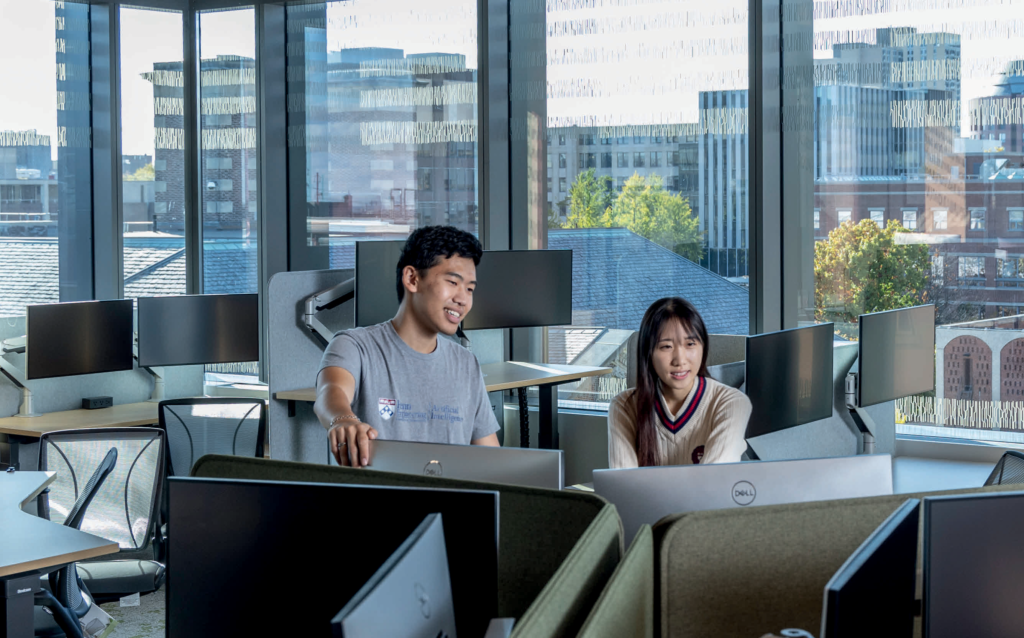
A Centered Approach
Penn’s IDEAS initiative encompasses scholars across several departments in the School and its research centers, including faculty from the Warren Center for Network and Data Sciences, the GRASP robotics lab, the ASSET (AI-Enabled Systems: Safe, Explainable and Trustworthy) Center and Penn’s new Center for Media, Technology, and Democracy. “The co-location of faculty in my field, which is computer vision and machine learning, with those in other disciplines such as natural language processing is also exciting,” adds Vidal.
Amy Gutmann Hall was designed with this interdisciplinary co-location at the forefront. It is equipped with dedicated spaces to support exploration and advancements in several multidisciplinary fields, including the Harlan Stone Center for Perception, the Schlein Center for Cybersecurity and The Duran Center, which focuses on data-driven solutions in health care.
“One of the real strengths of Penn, both in campus and in culture, is how easy it is for individuals to reach outside the boundaries of their disciplines and programs,” says Ives. “Each research floor in the new building is broad and cross-cutting, allowing for the cross-pollination of ideas from fields like bioengineering and neuroscience, computational social science, medicine and safe and trustworthy AI.”
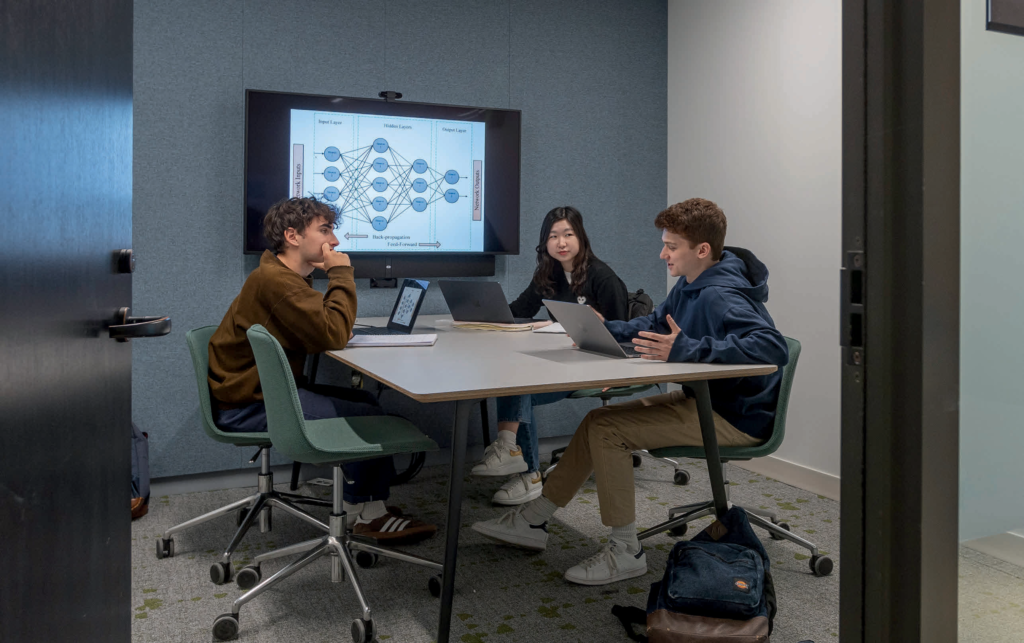
Amy Gutmann Hall boasts an impressive array of spaces for research, teaching and student collaboration, centralizing resources and tools for scholars from across Penn and beyond.
Why prioritize safe and trustworthy AI? “Like many technologies, AI is a dual-use technology,” says George Pappas, UPS Foundation Professor of Transportation in ESE and Associate Dean for Research in Penn Engineering. “It can transform the world positively or negatively, and it is up to us to ensure that AI is a force for improving our lives.”
Penn Engineering’s ASSET Center is working to do just that. “Recent advances have captured society’s imagination, but there are also concerns about these technologies and trust,” says Rajeev Alur, Zisman Family Professor in CIS and the Founding Director of ASSET. “The goal is to improve the reliability of AI systems, which is especially important in applications like health care, and this requires long-term, collaborative research on the foundations side to build the next generation of systems and solutions. In doing so, we will also establish Penn Engineering as a leader in the trustworthy AI space.”
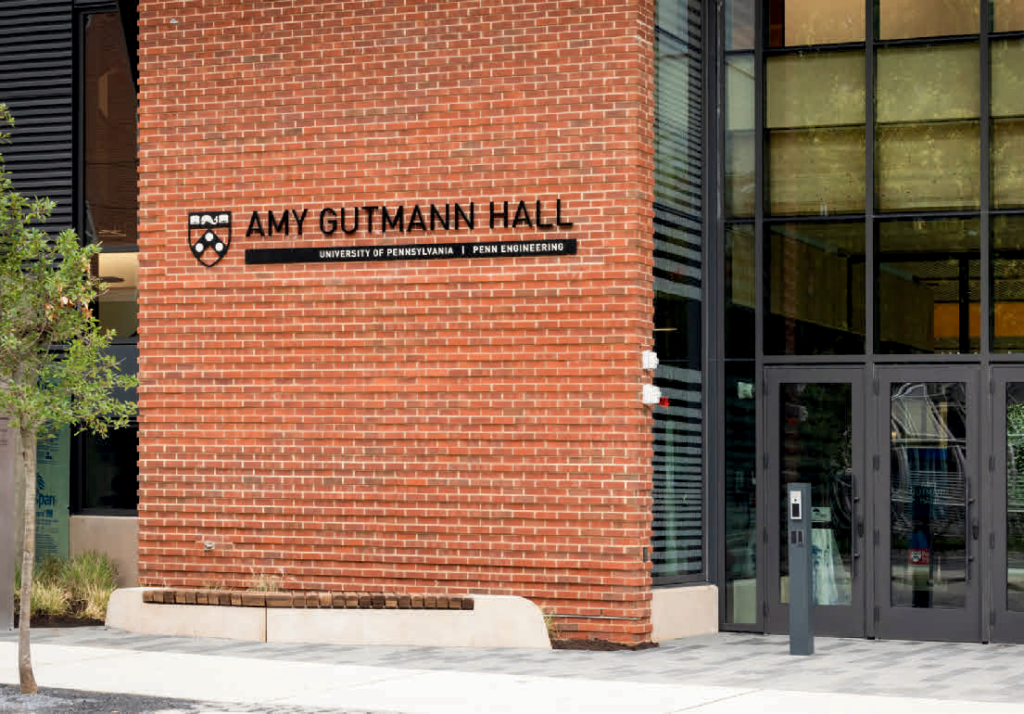
Educational Excellence
Upon entering the building, visitors will be immediately immersed in the unique educational environment that Amy Gutmann Hall provides. Within view on the first floor are the Rachleff Hybrid Learning Classroom Suite, a flexible teaching space, and the Jacqueline Africk and Andrew Africk Laboratory, an undergraduate lab that supports integrated hardware- and software-based instruction and project work at the nexus of AI and the physical world.
“The opportunity to have an undergraduate teaching lab as the foundation of the building is very exciting,” says Siddharth Deliwala, Alfred Moore Senior Fellow and Director of ESE Lab Programs. “The building allows for innovative educational programming where AI is not a separate technology, rather the computing is physically
all around.”
Anchoring the east end of the first floor is the Stavis Family Auditorium, which will host collaborative events and large lectures alike, allowing Penn Engineering to expand its course offerings. The auditorium’s south-facing wall is entirely made up of windows, creating an open and inviting, flexible-use space.
The second floor features additional teaching labs for cloud computing and ESE Senior Design, together with the Detkin Laboratory, which is being relocated from its previous home in Moore. These spaces are complemented by project design areas, group study rooms and open spaces with soft seating where students can connect and study, fostering community and a vibrant innovation culture.
These facilities will enhance the experience of students taking courses like those in Penn Engineering’s Data Science minor and master’s programs, and in particular, will anchor the School’s two newest degree offerings: the Raj and Neera Singh Program in Artificial Intelligence bachelor’s program and the Raj and Neera Singh Program in Artificial Intelligence online master’s program, each the first of their kind in the Ivy League.
Both programs allow students to capitalize on the outstanding career prospects of a rapidly growing field and feature a unique blend of courses in AI foundational principles, in the applications of AI in various engineering disciplines and in AI ethics, providing students with modern tools they can use as they develop AI technologies that have positive societal impact.
“Amy Gutmann Hall will have an enormous effect on student education and research,” says Pappas, who also serves as the Director of the undergraduate AI degree program. “It will become the center of all things AI at Penn.”
Amy Gutmann Hall features open, collaborative spaces with soft seating where students can connect and study, fostering community and a vibrant innovation culture.
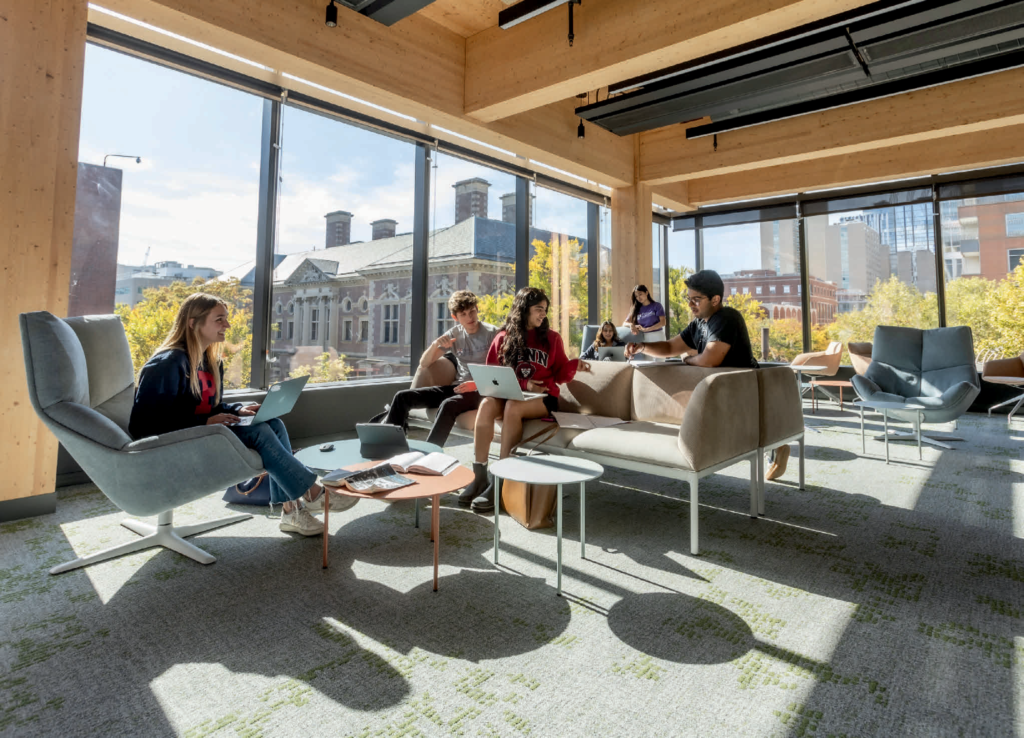
“These modern, flexible teaching spaces that have embedded recording studio capabilities designed to support live, synchronous learning mean that the experiences of our online students will be unparalleled,” adds Chris Callison-Burch, Professor in CIS and Director of the online AI master’s program.
Together, students in Penn Engineering’s courses and programs will leverage these opportunities, but the benefit does not stop there. Students in CIS, ESE and beyond will be at the forefront of innovation around AI, such as the need to support, or even better, reduce the amount of power that AI technologies currently gobble up.
“Some estimate that in eight years, 15% of total global energy will be used to run AI data centers,” says Deliwala. “We need to make computers less power hungry, to optimize energy use and develop better edge computing solutions. To do this, we need to blur the lines between disciplines. It’s a great vision for Penn Engineering’s educational programming.”
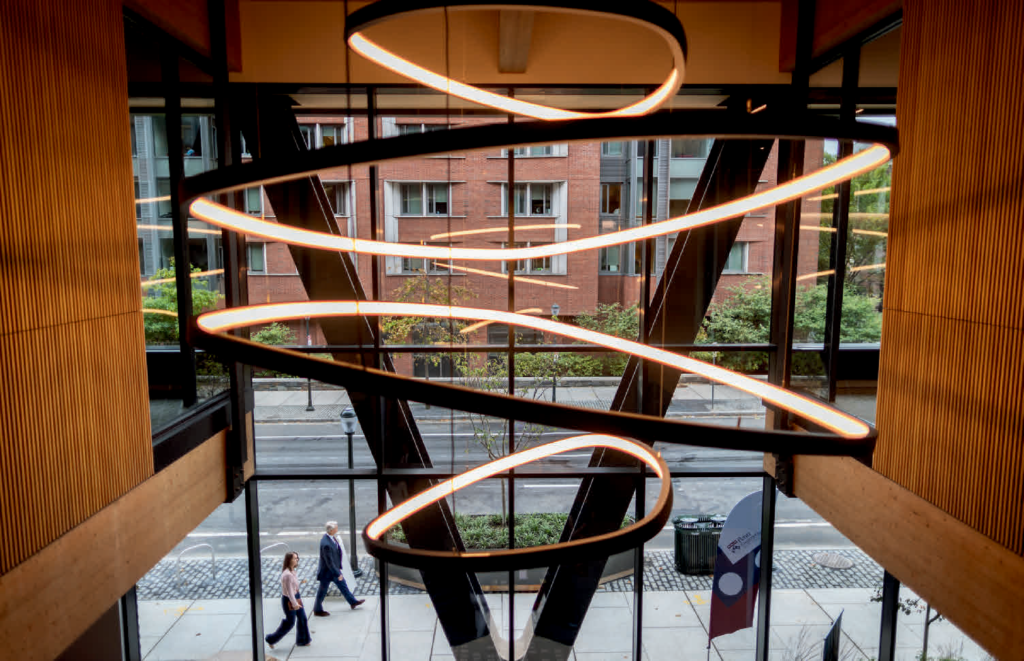
Principled Practice
Amy Gutmann Hall was planned under the University’s Penn Compact, with its foundational tenets of Innovation, Inclusion and Impact. Serendipitously, it also exemplifies the goals of Penn’s new strategic framework, In Principle and Practice, which holds at its core the principles of Penn as an Anchored, Interwoven, Inventive and Engaged University that strives to “channel Penn’s excellence and its boundless creative energy to meet the needs of our time.”
The positive impact of Amy Gutmann Hall will be felt far outside Penn Engineering. During planning, the building’s facilities were also designed to meet unmet needs across campus, the City of Philadelphia and beyond.
One key feature resides on the building’s third floor: the Data Science Hub. Envisioned as a hybrid library reference desk and core facility, users will be able to access expertise in data collection, analysis and visualization.
“The Data Science Hub is a first for Penn,” says Ives. “Whether it’s in the medical school or individuals in the City looking at how to best use their data, the Hub will connect our expertise with the people who need it. Additionally, we will be able to offer programming to pass on that expertise in a focused setting to users, opening the door to everybody.”
This open door means the building will also be able to host Penn Engineering’s Inveniam Outreach programs. Inveniam Outreach provides local youth with high-quality STEM training and enrichment programs that span the K-12 journey and connects participants to education and career readiness resources.
“With Amy Gutmann Hall, we’re giving Philadelphia students access to the kinds of hands-on experiences and mentorship that can be life-changing,” says Chanda Jefferson, Director of Community Engagement and Outreach in Penn Engineering’s Office of Diversity, Equity and Inclusion. “These labs and courses will help them build confidence and prepare for college and beyond. Penn’s outreach programs are truly one of a kind.”
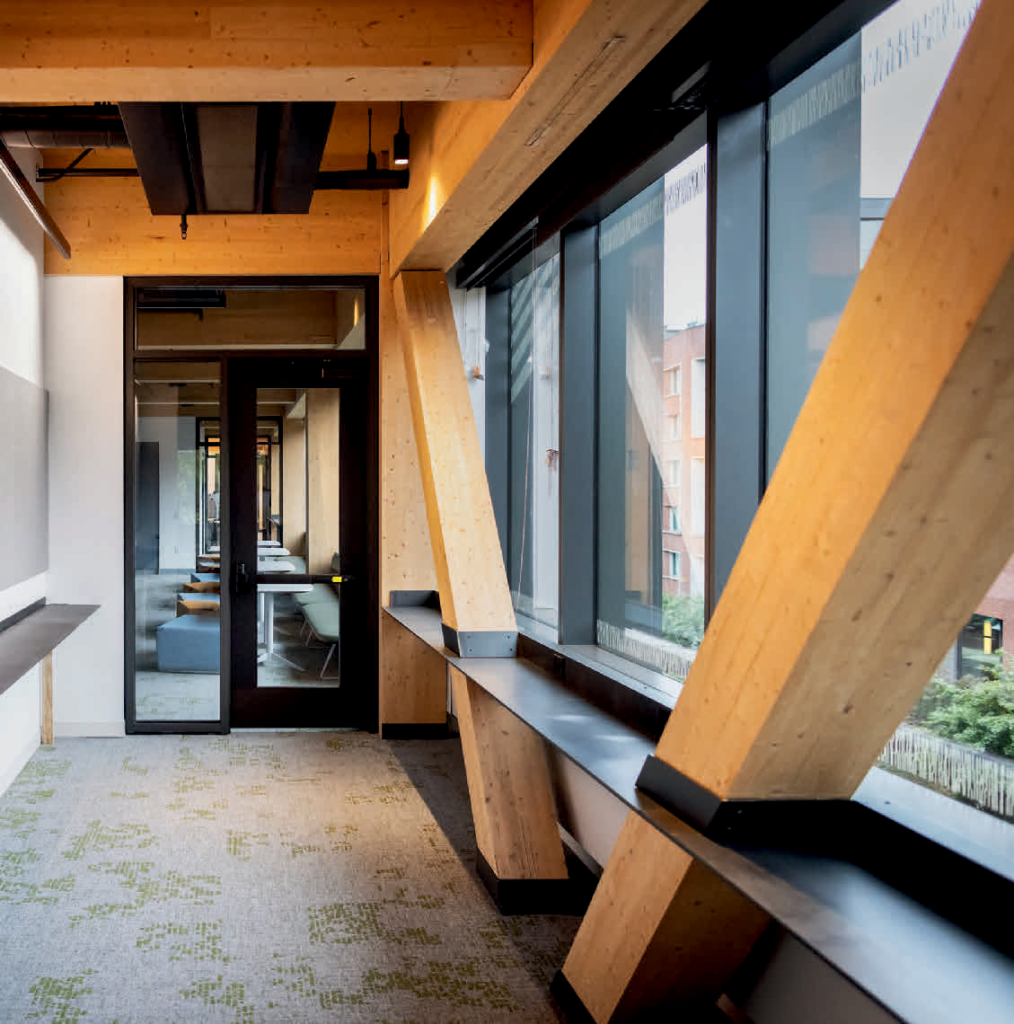
The construction of Amy Gutmann Hall used mass timber, a sustainable, yet remarkably resistant material. The warmth of the exposed wood throughout the spaces creates a welcoming, inspiring environment for the Penn Engineering community.
In addition to democratizing access to data science and related expertise, planning for Amy Gutmann Hall ensured that Penn’s values were upheld in the materials and construction of the building itself. Designed by Lake|Flato together with KSS Architects, and with construction led by Gilbane Building Company, Amy Gutmann Hall is the City’s first mass timber building, a material that reduces a building’s embodied carbon footprint by an estimated 55 to 70 percent. The material, fabricated in Quebec, Canada, arrived on campus in 82 truckloads, and in addition to its sustainability, the exposed wood evokes a warm, welcoming environment throughout.
Each piece of Amy Gutmann Hall seamlessly comes together to make it the ideal place for Penn Engineering to develop and deliver on the promise of AI and data science. “People should be excited about the future of AI,” says Callison-Burch. “It will have a tremendous impact on the nature of work, because it has the potential to make people more productive, creative and collaborative. Amy Gutmann Hall is a huge opportunity for Penn to help define the future.”
Looking Ahead
Planning for Amy Gutmann Hall has also allowed the School’s leadership to re-examine its share of campus as a whole.
“Amy Gutmann Hall served as a catalyst for Penn Engineering’s Blueprint for Campus Transformation,” says Mike Matthews, Vice Dean of Finance and Administration for Penn Engineering, in reference to the School’s new space planning initiative. “It set the stage for broader optimization efforts to provide state-of-the-art facilities for high-impact research, collaborative learning environments and spaces that enhance the overall sense of home for the Penn Engineering community.”
The initiative will involve the renovation of existing facilities, such as Hayden Hall North and GRW/Levine North, to provide enhanced collaboration and student engagement, and the addition of new, pathbreaking spaces, including interdisciplinary teaching labs, student spaces and a Think-Model-Make Center, where undergraduates will be free to create, make mistakes and achieve a sense of empowerment in overcoming those mistakes.
The project encompasses approximately 552,000 square feet (or about 85% of total space) across 15 buildings, no simple feat, especially as one considers repurposing spaces in historic buildings like Towne and Moore.
“When you have a complex like ours where buildings last for 100 years or more, we are stewards of these spaces,” says Zac Stevenson, Senior Director of Planning, Design and Construction for Penn Engineering. “As stewards, we want to ensure that we improve upon these spaces and responsibly serve the community while maintaining the integrity and history of our School.”
Upon full implementation of the plan, the hope is that Penn Engineering’s part of campus will share in a harmonious design that welcomes prospective students and faculty and attracts top talent to Penn.
“In 10 years, when asked who among the top 20 schools is doing it right, I’d want our peer schools to say that Penn Engineering is in the top two or three of that list,” says David Meaney, Solomon R. Pollack Professor in Bioengineering and Senior Associate Dean of Penn Engineering. “Penn was the first Ivy to create an AI undergraduate engineering degree, to create the kinds of spaces like those in Amy Gutmann Hall. I think many people will come to visit us at Penn Engineering when they have their own buildings to build.”
Story by Olivia J. McMahon / Photos by Lisa Godfrey, Kevin Monko and Eric Sucar
